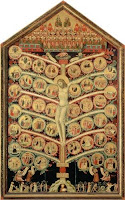Grounded Hope
By Debra Dean Murphy
April 2, 2010
Psalm 118: 1-2, 14-24; John 20:1-18
Supposing him to be the gardener, she said to him, “Sir, if you have carried him away, tell me where you have laid him, and I will take him away.” (John 20:15)
Let us not mock God with metaphor, / analogy, sidestepping transcendence; / making of the event a parable, a sign painted in the / faded credulity of earlier ages: / let us walk through the door. (Seven Stanzas at Easter by John Updike)
John the Evangelist sets the resurrection story in a garden, grounding Easter’s hope in, well, the ground. “The tree of life,” Vigen Guroian observes, “still stands in the midst of the garden.” No pie in the sky here; Easter is earth tended, mended and renewed, and a body alive again.
John Updike the poet reminds us that our hope lies not in nature’s rhythms of birth, death, and new life (comforting as they may be), nor in traditions handed down from learned teacher to disciples, but in the scandal and embarrassment of a resurrected body:
It was not as the flowers,
each soft Spring recurrent;
it was not as His Spirit in the mouths and fuddled
eyes of the eleven apostles;
it was as His Flesh: ours.
“Ours,” Updike says, not “mine.” The hope of resurrection is not that of Plato’s singular immortal soul; it is not the promise of a post-mortem spiritual existence in a far-off heavenly realm. The hope of resurrection is that the material creation in all its fullness participates—now partially, then perfectly—in newness of life, in communion with the Source of all that is. Heaven and earth are joined, through the mystery of Jesus’ rising from the dead, in the shalom of God.
The disobedience that occurred in the first garden was the burden Jesus bore in Gethsemane’s garden. In Easter’s garden, the burden has been rolled away. His broken body, now restored, makes of us a body, his body: “it was as His Flesh: ours.” And through the gifts of the good earth, grain and grape, harvested by human hands, we take, bless, break, and share his body, becoming what we already are.
We are grounded in this hope, nurtured by these gifts, sustained for the work and witness we are called to: go and tell; be and do; live mindfully, patiently, peaceably in the joy of the resurrection. “This,” we profess this day with the Psalmist, “is the Lord’s doing, and it is marvelous in our eyes.”
